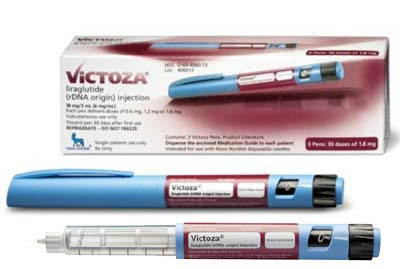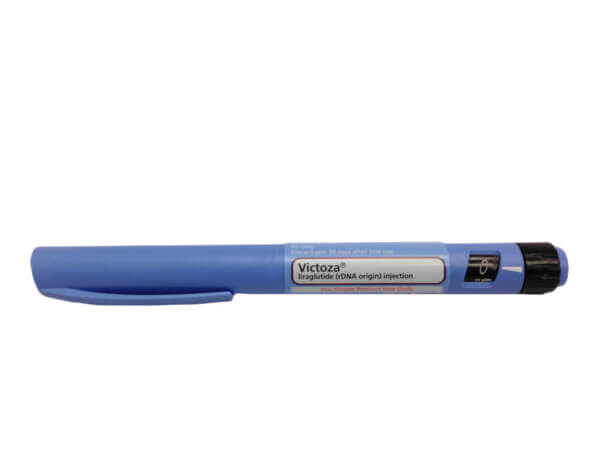Is Victoza Really a Game Changer for Diabetes or Just Another Risky Gamble?
- admin
- September 11, 2024
- 2:37 pm
- No Comments

Victoza, the brand name for the medication liraglutide, has gained considerable attention in recent years for its role in managing type 2 diabetes and promoting weight loss.
But is Victoza really the breakthrough treatment it’s claimed to be, or are there hidden risks that users should be aware of?
Given the chronic nature of diabetes, which affects millions worldwide, it’s crucial to determine whether Victoza is genuinely effective or carries significant downsides.
In this article, bestdietarysupplementfordiabetics.com will explore how Victoza works, its role in weight loss, potential side effects, and how it works alongside insulin.
I will also delve into its application for weight loss in individuals without diabetes and assess whether the cost is worth it.
All this backed by scientific evidence to answer whether Victoza is truly a game-changer or a risky gamble.
“Is Victoza Really a Game Changer for Diabetes” Article Index:
- How Victoza Works: The GLP-1 Agonist
- Victoza for Weight Loss
- Victoza for Weight Loss Without Diabetes
- Victoza Side Effects
- Insulin and Victoza: A Winning Combination?
- Uses for Victoza
- Victoza Injection Price: Is It Worth It?
- FAQs on Victoza for Controlling Blood Sugar Levels
- Conclusion: Is Victoza Really a Game-Changer for Diabetes or Just Another Risky Gamble?
How Victoza Works: The GLP-1 Agonist
Victoza belongs to a class of medications known as GLP-1 receptor agonists. GLP-1 (glucagon-like peptide-1) is a hormone that plays a role in blood sugar regulation by enhancing insulin secretion, suppressing glucagon release, and slowing gastric emptying.
The effect is improved blood sugar control without the drastic drops in glucose levels that insulin alone might cause.
Research shows that GLP-1 agonists like Victoza can lower HbA1c levels by around 1.0% to 1.5%, a significant decrease for many people with type 2 diabetes.
According to the American Diabetes Association, GLP-1 receptor agonists are often recommended as second-line treatments after metformin, particularly for patients who are overweight or have cardiovascular risks.
Victoza for Weight Loss
One of the standout uses for Victoza is its ability to promote weight loss. Clinical trials have shown that people using Victoza for weight loss can lose between 5-10% of their body weight over a few months, which is significant for those struggling with obesity, especially when combined with diabetes.
The weight loss benefits of Victoza are linked to its ability to reduce appetite and slow down the digestion of food.
However, it is important to remember that while effective, Victoza is not primarily a weight-loss drug—it is first and foremost designed for diabetes management.
Still, its dual role has made it attractive to many patients who are overweight or obese, with the added benefit of improving metabolic markers beyond blood glucose levels.

Victoza for Weight Loss Without Diabetes
A growing number of individuals without diabetes are turning to Victoza for weight loss without diabetes. The FDA has approved a higher dose of liraglutide (under the name Saxenda) for weight management, but off-label use of Victoza itself has risen.
While this can be effective, it is important to consult a healthcare professional before considering this route, as Victoza was primarily designed for people with diabetes.
Though studies show weight loss benefits even in non-diabetic individuals, potential users should be aware of the risks and side effects, which can be more prominent in those without a medical reason for using the drug.
Victoza Side Effects
Like most medications, Victoza side effects are important to consider, especially when evaluating its safety for long-term use.
Common side effects include nausea, diarrhea, and vomiting, which are often temporary but can be bothersome. In rare cases, Victoza can cause more serious side effects such as pancreatitis, kidney problems, and gallbladder disease.
One particular concern that has emerged is the potential risk of thyroid tumors, including medullary thyroid carcinoma (MTC).
Although this side effect is considered rare, it has led to a black box warning from the FDA. Patients with a family history of thyroid cancer are often advised to avoid using Victoza.
Insulin and Victoza: A Winning Combination?
While Victoza is not insulin, it’s often used alongside insulin to help improve glycemic control. Many people ask, “Is Victoza insulin?” and the answer is no—Victoza is liraglutide, a GLP-1 receptor agonist.
However, it complements insulin therapy by working in a different way to help the body manage blood sugar levels.
For people with advanced diabetes who may already be using insulin, adding Victoza to the treatment plan can reduce the total amount of insulin needed while helping to stabilize blood sugar levels. Alternatively, you may do so via herbs that lower blood sugar fast.
Combining insulin and Victoza offers the dual benefit of controlling post-meal glucose spikes and reducing the risk of hypoglycemia, which is a common concern with insulin.
Uses for Victoza
The uses for Victoza go beyond just lowering blood sugar. For people with type 2 diabetes, Victoza has demonstrated cardiovascular benefits.
Clinical trials such as the LEADER trial showed that Victoza can significantly reduce the risk of major adverse cardiovascular events, such as heart attack and stroke, in people with type 2 diabetes.
Additionally, Victoza’s ability to help with weight loss offers metabolic benefits, improving cholesterol levels and reducing blood pressure in some patients.
As a result, it is often prescribed to people who need help managing both diabetes and weight-related issues.
Victoza Injection Price: Is It Worth It?
The Victoza injection price is a point of contention for many. With prices in the U.S. averaging around $1,000 per month for people without insurance coverage, it is significantly more expensive than many other diabetes medications.
While the benefits of Victoza, such as improved blood sugar control and weight loss, are undeniable, the cost may be prohibitive for some.
For those with health insurance, the out-of-pocket cost is often reduced, but it is still important to check with your provider.
As the price is high, some people question whether the benefits are worth the financial strain, especially when other diabetes treatments are available at a lower cost.
FAQs on Victoza for Controlling Blood Sugar Levels
Q-1: How does Victoza’s effect on appetite regulation contribute uniquely to diabetes management compared to other treatments?
A-1: Victoza (liraglutide) mimics a gut hormone that helps regulate appetite by promoting satiety, which can lead to weight loss—a significant benefit for many type 2 diabetes patients. This appetite modulation is distinct from traditional glucose-lowering drugs, offering a dual mechanism that not only improves blood sugar control but also addresses obesity-related factors often underlying diabetes progression.
Q-2: Are there underexplored cardiovascular benefits or risks associated with Victoza that patients should be aware of?
A-2: While Victoza has demonstrated cardiovascular benefits in reducing major adverse events in high-risk patients, subtle individual variations in heart rate and blood pressure responses may occur. These nuanced effects suggest the need for personalized cardiovascular monitoring to balance benefits against possible risks like increased heart rate, which could be overlooked in broad clinical assessments.
Q-3: Can Victoza’s impact on pancreatic function pose hidden long-term risks not yet fully understood?
A-3: Victoza stimulates insulin secretion in a glucose-dependent manner, which supports pancreatic beta-cell function. However, the long-term effects of sustained stimulation remain under investigation, with some concern about potential overstimulation or inflammation that might affect pancreatic health over years of use, emphasizing the importance of ongoing research and cautious clinical use.
Q-4: How might Victoza influence mental health or cognitive function in diabetic patients differently than other therapies?
A-4: Emerging reports suggest that Victoza may affect brain regions involved in appetite and reward, potentially influencing mood and cognitive processes. While evidence is limited, this neurobehavioral impact represents an area rarely assessed in diabetes treatments, warranting closer attention to psychological well-being during therapy.
Q-5: Does Victoza alter gut microbiota in ways that could affect diabetes outcomes or overall health?
A-5: Preliminary studies indicate that Victoza may influence the composition and function of gut microbiota, which plays a critical role in metabolism and immune response. These changes could contribute to its metabolic benefits or, conversely, unforeseen side effects, highlighting a novel and less understood dimension of its action.
Q-6: What are the implications of Victoza’s injectable form on patient adherence and treatment success compared to oral diabetes medications?
A-6: Victoza’s injectable delivery can be a barrier for some patients due to discomfort or inconvenience, potentially impacting adherence. However, for patients motivated by weight loss and cardiovascular benefits, the injectable form may reinforce commitment to therapy. Understanding patient preferences and providing supportive education is crucial to maximize its effectiveness.
These FAQs shed light on Victoza’s multifaceted role in diabetes care, balancing its innovative benefits with nuanced considerations, and encouraging informed patient and clinician decision-making.

Is Victoza Really a Game-Changer for Diabetes or Just Another Risky Gamble?
So, is Victoza really a game-changer for diabetes? Based on the evidence, Victoza offers significant benefits in managing blood sugar levels, promoting weight loss, and even reducing cardiovascular risks for people with type 2 diabetes.
For these reasons, it has been called a game-changer by many in the medical community.
However, it is not without risks. The high cost, potential side effects like thyroid tumors common in Alstrom Syndrome, and gastrointestinal discomforts are all factors that should be carefully considered.
For those without diabetes seeking Victoza for weight loss, it may not be worth the gamble given the availability of other weight management strategies.
In conclusion, Victoza can be an incredibly powerful tool for managing diabetes when used correctly and under medical supervision.
However, as with any medication, it is essential to weigh the benefits and risks carefully. Consulting with a healthcare professional is crucial to ensure Victoza is the right choice for your specific health needs.
References: